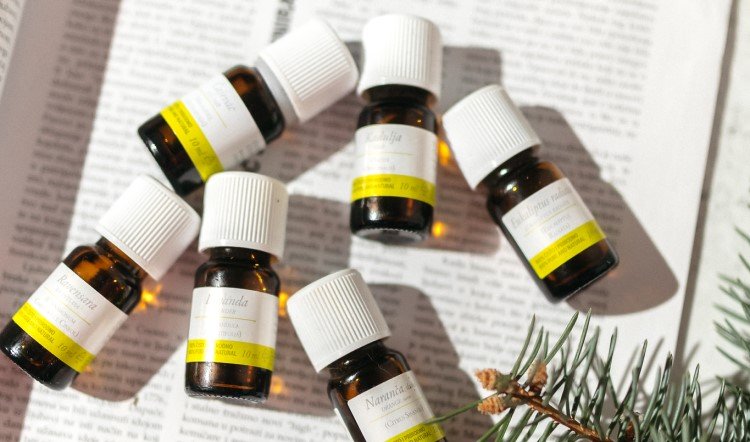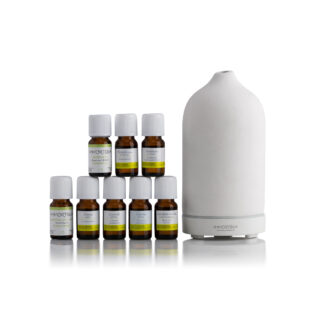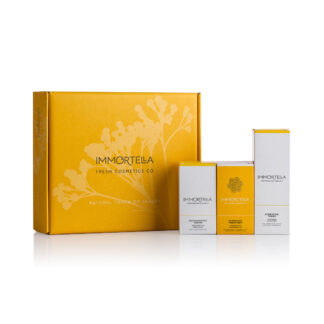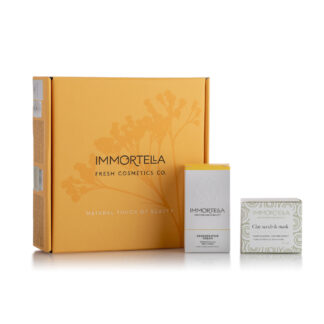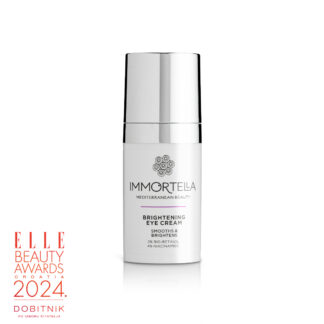In line with modern ecological trends and human efforts to return to a more natural lifestyle, interest in aromatherapy has grown in the last 20 years.
Better and calmer sleep can be achieved by spraying a few drops of lavender essential oil on the pillowcase? Inhaling peppermint essential oil relieves stuffy nose difficulties? Do essential oils really work, what are their benefits and how to recognize quality essential oils?
What are essential oils?
Essential oils are highly concentrated extracts of plant materials – seeds, flowers, stems or roots. They are usually obtained by distillation of plant material, and rarely by cold expression. Very large amounts of plant material give a small amount of essential oil. In average, over 4 tons of rose petals are needed to obtain 1 kg of rose essential oil. Although they are called oils, essential oils are not greasy. Their structure and consistency is very different from vegetable oils tkat we are used to. These are lipophilic molecules (meaning they like fatty solvents) of low molecular weight that are very easily absorbed through the skin, and due to their high volatility they have been administered by inhalation for centuries.
What is aromatherapy?
Aromatherapy is a part of phytotherapy that uses essential oils in order to maintain health, treat and prevent illness. Modern aromatherapy was born in 1910. when French chemist and perfumer Gattefoss dipped his hands into a container with lavender essential oil after an explosion in his laboratory. He immediately felt relieved, and the burns healed surprisingly quickly.
Aromatherapy sees a person as a whole being – the unity of spirit, mind and body. Each client is approached individually and a detailed medical history is always taken. Lifestyle, eating habits, emotion and fears are questioned, and based on those informations essential and base oils are selected to help the client in his treatment and recovery. Aromatherapists cultivate a holistic approach and choose methods for each client that balance his psyche and body. The goal is not just to alleviate symptoms, but to treat the whole person.
How to recognize quality essential oils?
Other then nice scent, in order for essential oils to have a therapeutic effect they need to be natural and of good quality. Essential oils are often forged with synthetic compounds, cheaper oils with similar scent, or are subjected to unnecessary chemical processes. There are many oils of dubious quality on the market, so you need to be very careful while buying them.
How to recognize good quality essential oil?
The bottle, declaration or certificate should contain following information:
- Latin name of the genus and plant species – different species of the same genus have different effects, so it is very important that this information is emphasized on the essential oil.
- Part of the plant from which the essential oil is obtained – more than one essential oil can be obtained from one plant, depending on the part of the plant that is extracted.
- Method of essential oil obtaining
- Main chemical components of essential oil (chemotype) – essential oil of a particular plant may have several chemotypes of different composition and action. If it is not stated on the label, you don’t really know what are you buying
- Country of origin of the plant material from which the essential oil is obtained
- LOT number
- Expiration date
- Hazard statements – essential oils are natural, but they contain natural ingredients that are dangerous substances. Essential oils without these labels are not better or safer than others, they are not labeled according to legal regulations.
Useful to know!
Essential oils are stored in dark bottles because chemical compounds in them become unstable if stored in plastics. Essential oil in plastic packaging is probably fake.
We have already mentioned that it takes about 4 tons of petals to get one kilogram of rose essential oil. Rose essential oil sold at a low price certainly isn‘t natural and of high quality!
A simple trick to test the quality – drip a few drops of essential oil on a paper towel, if it leaves a greasy trace than it is not pure essential oil – it is mixed with base oil!
Do essential oils work?
Given that there are many essential oils on the market with various declared effects, we could say that we have a cure for almost every condition. But do essential oils really work?
Antibacterial action is surely the most important effect of essential oils. During winter, it is a great relief knowing that with the help of pleasant scented essential oils we can reduce the number of bacteria indoors.
Other than antibacterial, many essential oils also show antiviral action, which makes them an excellent support in the prevention of various viral infections and alleviation of their simptoms.
Essential oils help in preventing diseases and recovering from illness or stress. According to scientific research, lemon essential oil helps to relieve anxiety in patients suffering from dementia.
Essential oils cannot replace medications or standard medical care, but they are a great addition to conventional treatments in many conditions. Thanks to their antiviral and antibacterial action they are an excellent solution for preventing or alleviating the symptoms of colds and flu. Soothing effect of some essential oils certainly helps in mantaining mental health and recovering from illness or stress.
Application of essential oils
Essential oils are used for various conditions such as inflammations, infections, injuries and other skin conditions. In addition to inhalation or spraying in a diffuser, they are often used as ointments, creams, gels and oil mixtures. We will go over some of the essential oils and their application.
Eucalyptus essential oil (Eucalyptus Radiata) has a strong antiviral action and hepls clearing airways during colds or flu. It is often used in inhalers, mouthwashes and as a repellent.
Geranium essential oil (Pelargonium Graveolens) is used for fungal diseases. In folk medicine geranium was used to treat conditions such as: skin problems, dysentery, hemorrhoids, inflammations and heavy menstruation. It is used for acne, dilated capillaries, small wounds and bleeding, seborrheic dermatitis and for skin with wrinkles.
Lavender essential oil (Lavandula Angustifolia) is used as an antiseptic in case of minor cuts and burns. It has antidepressant action, relieves headaches and clears the mind. A few drops of lavender essential oil added to a cream or oil perfectly soothes the skin after a full day of sun exposure, while a few drops of lavender essential oil on a pillow allows a peaceful and quality sleep.
Lemon essential oil (Citrus Lemon) is used for relaxing and mood lifting, to relieve symptoms of stress and depression. Due to its mild antibacterial and antiviral action, it helps prevent colds an flu.
Tea tree essential oil (Melaleuca Alternifolia) has a strong antifungal, antibacterial and antiviral action. It helps strengthen the immune system and is suitable for acne-prone skin. Thanks to it’s antibacterial and antiviral action, it alleviates the symtopms of cols and flu.
Sage essential oil (Salvia Officinalis) is a good anti-depressant. It helps with menstruations, excessive sweating, bloating and balances blood pressure. It is effective against migraines, hair loss and dandruff. Helps with insect bites. In aromatherapy, it is mainly used for imbalance of female sex hormones.
Ravintsara essential oil (Cinnamomum Camphora ct. Cineol) is very mild and safe multi-purpose oil and one of the most potent antiviral essential oils. It is used as a prevention during the flu, and to refresh the air.
Rosemary essential oil 1,8 cineole (Rosmarinus Officinalis) stimulates hair growth and gives it a healthy and shiny look. Normalizes excessive sebum production and helps with dandruff and seborrhea. It has a moderate antiviral effect, strengthens the immune system, stimulates circulation and helps reduce cellulite.
Peppermint essential oil (Mentha Piperita) acts as a powerful analgesic and helps with migraines, headaches, neusea and painful menstruations. It has moderate antiviral and antibacterial effects and eliminates the feeling of bloating, nausea and stomach pain.
Frankincense essential oil (Boswelia Carterii) has a very meditative effect, so it is still used in churches and temples. It has a calming effect and helps reduce tension and stress.
Sweet orange essential oil (Citrus Aurantim Dulcis) has a sedative and calming effect and helps with anxiety, nervousness and feeling of restlessness. Due to its revitalizing effects on the skin and pleasant smell, it’s often used in cosmetics.
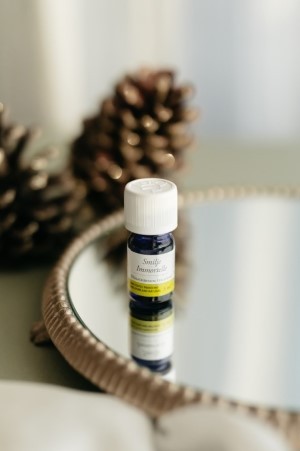 Immortelle essential oil (Helichrysum Italicum) is known for its anti-inflammatory, healing and anti-bruising effects. In folk medicine it was used to treat asthma, migraines, liver problems and skin diseases. It is especially known for its anti-aging action.
Immortelle essential oil (Helichrysum Italicum) is known for its anti-inflammatory, healing and anti-bruising effects. In folk medicine it was used to treat asthma, migraines, liver problems and skin diseases. It is especially known for its anti-aging action.
How to use essential oils
Essential oils are most commonly used by inhalation or dermal. Oral use is not recommended without prior consultation with a doctor or aromatherapist because not all essential oils are intended for this type of application!
Dermal application of essential oils provides therapuetic benefits by absorbing essential oils through the skin. Due to their high lipophylity they enter the body very quickly so they need to be diluted in a base oil such as almond, olive or jojoba oil. Aromatherapeutic massages promote mental and physical relaxation which leads to reduction of stress, blood pressure and improved circulation and health in general. Disperse essential oils in the base oil and apply the mixture on the skin, with special emohasis on sore and tensed muscles. You will feel relieved in a very short time. Essential oils can be added to your favorite product such as a tonic, serum, or muscle gel.
Inhation of essential oils helps primarily with respiratory problems, colds, flu and sinusitis, and is also recommended for anxiety, depression, PMS, relaxation and better sleep. The simplest method of inhalation is directly breathing in essential oil from the bottle. It is recommended to take several deep breaths, but carefully so the undilluted oil does not come into the contact with skin. A pot of hot water and a towel are needed for the steam method. Place a towel over your head and bowl, then close your eyes and take a few deep breaths of steam. Inhalation of essential oils is also conducted with the help of diffusors, which will be discussed later.
Essential oils must not be applied directly to the skin, they need to be diluted in base oil to avoid skin irritation! They are not suitable for using near sensitive areas such as eyes, ears and mouth or broken, inflamed or irritated skin.
Children uder 12, pregnant women, nursing mothers and people with chronic conditions should consult a doctor before using essential oils.
To ensure that essential oil wont irritate your skin, you can do a patch test- drip a small amount of diluted oil on your wrist or behind your ear and wait 24 hours to see if there is a reaction.
Mind and body health
Mental state – emotions, moods, behaviours and social, work and economic status have a great impact on the health. The human body is not the sum of individual parts, but a complex and interconnected system. In other words, when a problem or imbalance occurs in one organ, the whole organism feels the consequences.
More and more drugs come on the market every year, and at the same time people are getting sicker. With the fast-paced lifestyle, stress has become a part of our every day life. In order to maintain the health of our body, it is necessary to work on the mind health. Hippocrates believed that the soul should be healed first, and only then the body. Aromatherapy is one of very successful ways to relax and bring the mind and the body into balance with which we will certainly improve the mental and thus the physical condition of our body.
Application in diffusers
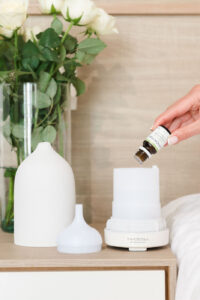 Diffusers are designed to disperse essential oils into space in form of tiny droplets. These practical devices are a healthier and longer-lasting alternative to synthetic air fresheners, and another bonus is that you choose the scent of the essential oil yourself.
Diffusers are designed to disperse essential oils into space in form of tiny droplets. These practical devices are a healthier and longer-lasting alternative to synthetic air fresheners, and another bonus is that you choose the scent of the essential oil yourself.
Diffusers do not heat the essential oils to the evaporation temperature, but spray them cold and unchanged into the space, which means that all the components of the essential oil are present in the air. There are several types of diffusers on the market, of which the two are the most popular and therapeutically most valuable, which we will explain in more detail below.
Classic diffusers or nebulizers work on the principle of blowing essential oil. All you need to do is pour a few milliliters of essential oil into the tank and turn on the diffuser. Their advantage is that they fill the space with essential oils faster than ultrasonic diffusers, so they are more suitable for larger spaces and more efficient for direct inhalation. At the same time, their advantage is also their biggest disadvantage because they consume more essential oils than ultrasonic diffusers. A potential disadvantage of these diffusers is the material – they are mostly made of glass and are prone to breakage, and spare parts are often expensive and unavailable. They are also slightly louder than ultrasonic diffusers.
With ultrasonic diffusers, essential oils are mixed with water or hydrolate, which is a great option when it comes to babies respiratory problems. They work on a simple principle – with ultrasonic vibrations they break water and essential oils into small particles and disperse them in the form of a mist. They can work for hours but they achieve a lower concentration of essential oils in the air than the classic type, which is also an advantage because you can leave them working all night without worries and simply add a few drops of essential oil in the morning to freshen up the space.
A quality diffuser is a good investment which will save your money from buying air fresheners and fragrances, and on the other hand contributes to your mental and health well-being.

